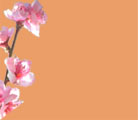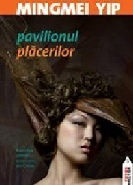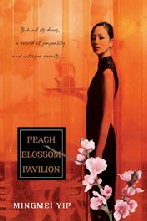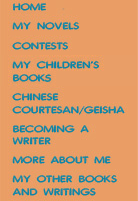


Copyright 2008
Mingmei Yip



Peach Blossom Pavilion
Available online and at all major bookstores:
Buy Now!
Mingmei’s gift shop If you buy from my site, you will get an autographed copy with my Chinese seal. If you buy 2 or more copies (They make great gifts!), you can choose one of the following free gifts: an original print of Mingmei’s Chinese goddess painting or a CD of Mingmei‘s qin playing and singing.

Peach Blossom Pavilion has been published in Romania!
Only 7 weeks after its release, Peach Blossom Pavilion is already in its 4th printing!!!
Peach Blossom Pavilion is the story of the last courtesan, or geisha, in China. With
great insight based on detailed research carried out in China, Mingmei has re-
Chinese Geisha culture was the predecessor of its counterpart in Japan (see “Introducing the Chinese Courtesan/Geisha Culture”), so if you’ve read or seen Memoirs of a Geisha, you must read Peach Blossom Pavilion!
The Story:
Publisher’s Weekly
“A courtesan’s vow to avenge her father’s execution and her mother’s banishment to a nunnery.”
Kensington Books
“In a sunny California apartment, a young woman and her finance arrive to record
her great-
When Precious Orchid’s father is falsely accused of a crime and found guilty, he is executed, leaving his family a legacy of dishonor. Her mother is banished to a Buddhist nunnery and she is abandoned to the “care” of a relative in Shanghai.
At first, life at Peach Blossom Pavilion feels like a dream. Surrounded by exotic
flowers, murmuring fountains, colorful fishponds, and jade-
Praise for Peach Blossom Pavilion:
Neal Chandler, director, Creative Writing Program of Cleveland State University:
“In the sure voice of Precious Orchid, Mingmei recounts thirteen tumultuous years of Chinese history: vicious politics, pristine piety and heartrending scandal, framed in the classical arts. She writes with a painter’s fastidious eye and the irresistible energy of grand storytelling. The pages just turn themselves.”
Max Byrd, Professor of English, University of California, Davis:
“I thought Peach Blossom Pavilion was beautifully written, wonderfully imagined—erotic, funny, bursting with life—a terrific novel!”
Hannelore Hahn, Founder and Executive Director, International Women’s Writing Guild:
“Peach Blossom Pavilion, the story of the last geisha in China, is told with amazing insight as if the author had lived in the tumultuous China of a century ago. Through her beautiful, lucid prose, Mingmei brings modern Western readers into the mysterious world of the cultivated courtesan.”
Chun Yu, author of Little Green: Growing up during the Chinese Cultural Revolution:
“Peach Blossom Pavilion is a vivid account of the forgotten past.”
Why I wrote Peach Blossom Pavilion
I have been a performer and scholar of China’s most revered and oldest string instrument,
the qin (seven stringed zither) for many years. As I researched on this instrument,
I found out that qin playing was not only a favorite pastime among the educated elite,
including privileged, refined high-
Originally called Yiji, Chinese courtesans were the predecessors of their Japanese counterparts. (“Geisha” is the Japanese pronunciation of the same word in Chinese.) Since most people only know about the Japanese Geisha, especially through Arthur Goldsmith’s widely enjoyed novel, Memoir of a Geisha, I decided to write about the Chinese Geisha phenomenon, so that people in the West will learn about the original form of this fascinating, yet hauntingly sad, way of life.

Mingmei’s novel Peach Blossom Pavilion. In all major bookstores June 2008! Kensington Books

